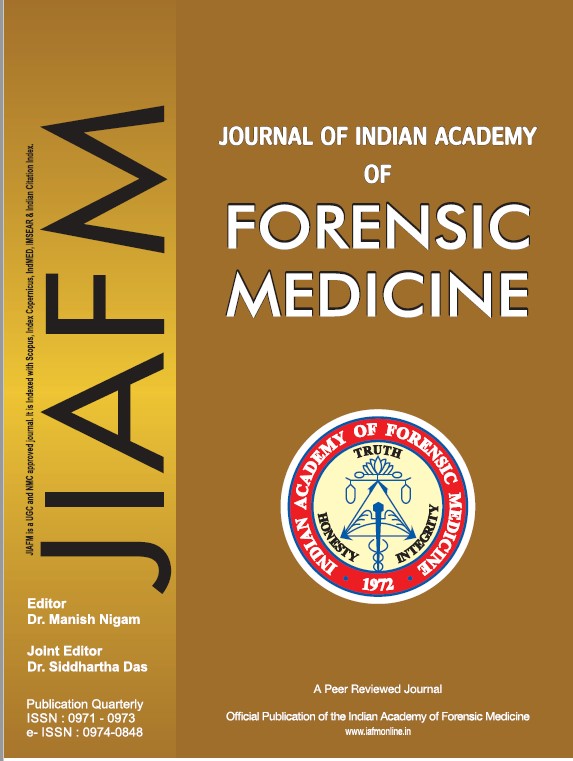A Rare Case of Suicidal Hanging with Ligature Tied around the Abdomen – A Case Report
DOI:
https://doi.org/10.48165/jiafm.2023.45.3.17Keywords:
Suicidal hanging, V' shaped ligature mark, Ligature tied around abdomenAbstract
Hanging is a common method of committing suicide. Usually in hanging, ligature and knot form a fixed or running noose around neck and seldom simple loop without knot is used. A 35 years old male committed suicidal hanging using a saree as ligature wherein the compression of neck has occurred in the absence of a noose, loop and knot around the neck. The body of the deceased was suspended from hook in ceiling by a saree used as ligature material, with the two limbs of the ligature passing around the neck, crossing over to opposite sides of the chest, and finally knot tied in front of abdomen after encircling the back. This arrangement of ligature material tied around the abdomen acts like a harness supporting the body weight. As a result, despite complete suspension of the body from the suspension point, the fatal pressure on the neck is produced only by the head and maybe by the forward leaning chest and arms, as in partial hanging.
Downloads
References
Azmak D. Asphyxial Deaths - A Retrospective Study and Review of the Literature. The American Journal of Forensic Medicine and Pathology, 2006; 27(2):134–144.
Biddle L, Donovan J, Owen-Smith A, Potokar J, Longson D, Hawton K, et al. Factors influencing the decision to use hanging as a method of suicide: qualitative study. The British Journal of Psychiatry, 2010; 197(4): 320-325.
Dimaio VJ, Dimaio D. Forensic Pathology. 2nd Edition. Boca Raton: CRC Press. 2001. 247p.
Sauvageau A. True and simulated homicidal hangings: a six year retrospective study. Medicine, Science and the Law, 2009; 49(4): 283–290.
Karmakar RN, editor. JB Mukherjee's Forensic Medicine and th Toxicology. 5 Edition. Kolkata: Academia publishers; 2018. 559-560p.
Reddy KSN, Murty OP. The Essentials of Forensic Medicine and Toxicology. 34th Edition. New Delhi: Jaypee Brothers Medical Publishers (P) Ltd; 2017. 315p.
Ambade VN, Tumram N, Meshram S, Borkar J. Ligature material in hanging deaths: The neglected area in forensic examination. Egyptian Journal of Forensic Sciences, 2015; 5(3):109-113.
Nithin MD, Rani S. Suspension without a knot in the noose. Medicine, Science and the Law, 2014; 54(2):113–115.
Kumar V. Hanging without knot in the noose. Journal of Forensic and Legal Medicine, 2007; 14 (1):35–38.


